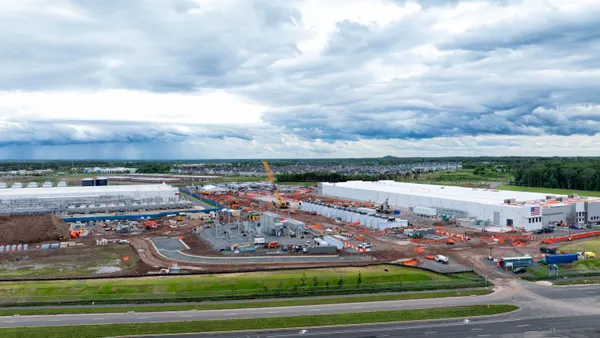Dive Brief:
- Oracle and AWS activated the first Oracle Database@AWS site Monday. The multicloud database solution is available in limited preview to customers in AWS's U.S. East region, Oracle said in an announcement.
- Oracle’s AWS integration is designed to remove migration barriers. The solution lets customers move Oracle Exadata and Oracle Real Application Cluster workloads to the cloud, connecting enterprise data to AWS analytics, machine learning and AI capabilities, according to the companies.
- The two companies intend to expand the partnership to other regions after the first deployment reaches general availability next year, Leo Leung, group VP of Oracle Tech and OCI, told CIO Dive. “We're starting with a single availability zone, but once we get into full swing, the plan is for multiple regions and multiple availability zones per region,” he said.
Dive Insight:
AWS is the last of the three largest hyperscalers to open its data centers to Oracle.
Oracle cemented the database accord with AWS in September, after forging similar alliances with Google Cloud in June and with Microsoft in September 2023.
Google Cloud announced the launch of its first four Oracle database integration regions two months ago. The Microsoft partnership has yielded nine active Oracle Database@Azure sites. The companies plan to expand the offering to 24 additional regions next year.
“Microsoft and Oracle have been working together on-prem for decades,” Leung said. “We've had mutual customers for much longer than the other providers.”
The Azure and Google Cloud integrations encompass Oracle’s Exadata platform as well as automated database management services. They’ve both added the Oracle data recovery solution, as well, according to Leung.
While the AWS alliance is just getting off the ground, it has room to grow.
“AWS is still the market leader in cloud, with a huge customer base,” Leung said. “It's going to be interesting to see the types of customers we get and the types of things they want to do.”
The partnership launched with Oracle’s general database solution, but Oracle aims to grow the offering.
“We're going to start with Exadata and we’ll see what’s next based on customer demand,” he said. “Certainly, the goal is to expand.”
Obstacles to hybrid multicloud adoption are gradually eroding, as organizations level up data operations to fuel analytics, ML and generative AI capabilities. Regulatory scrutiny on the competitive environment in the massive market for cloud services has helped, too.
“This renewed focus on data management is integral to GenAI adoption,” Dave McCarthy, VP of cloud and edge infrastructure services at IDC,” said in an email. “Both Oracle and AWS have been investing in hybrid solutions that allow customers to choose what data to bring to the cloud and what remains on-premises.”















